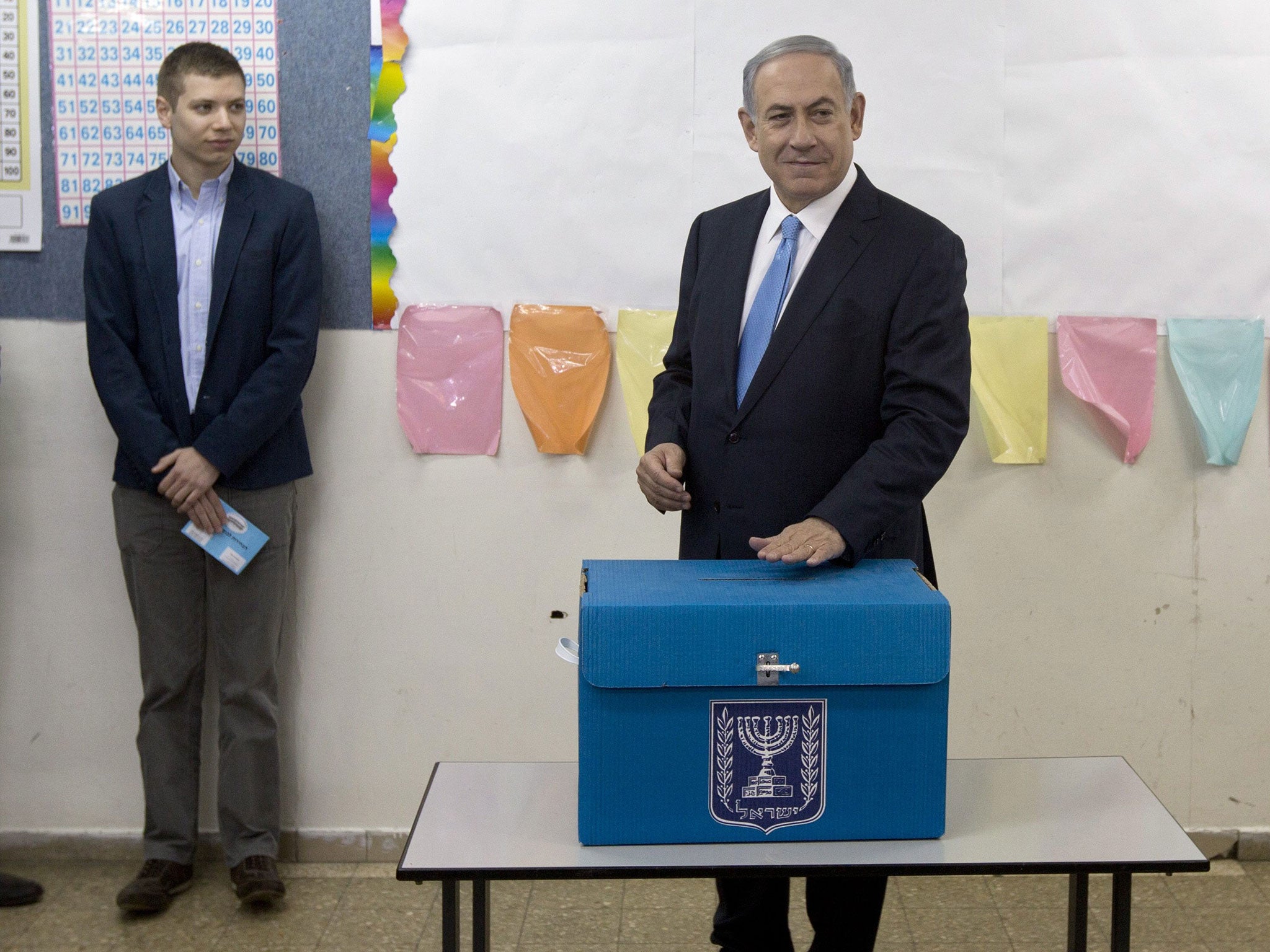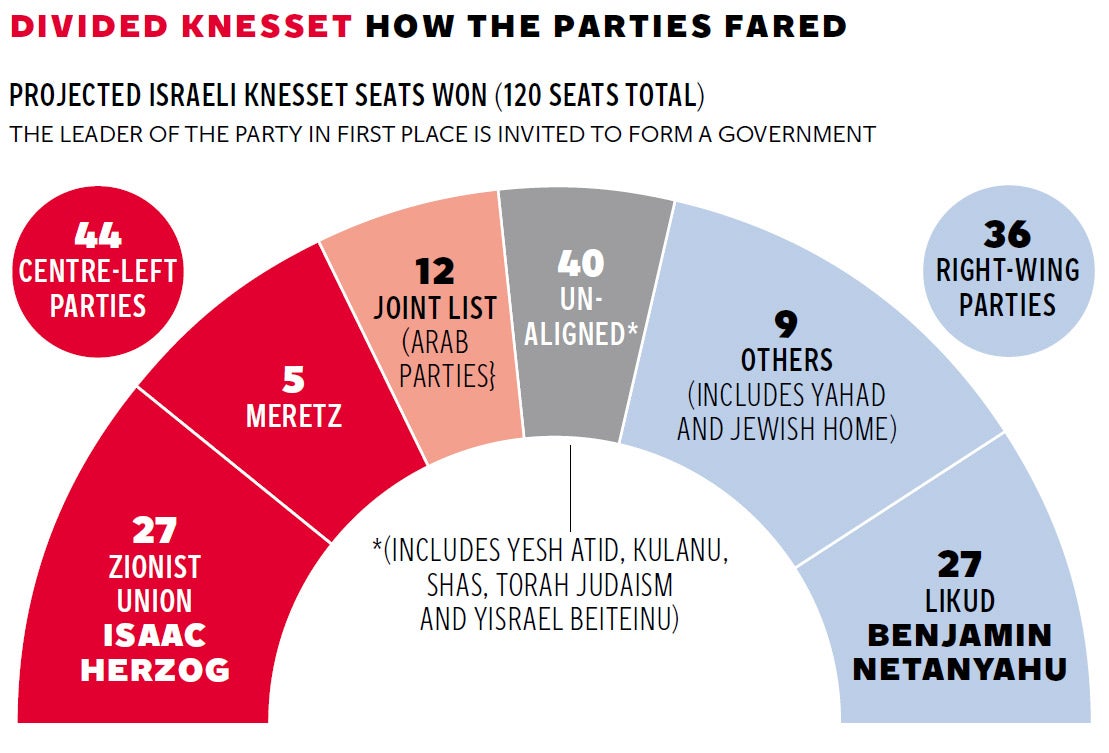Israel election: Secrets of the Netanyahu campaign - how he turned the election on its head
He might still emerge as head of a new coalition government

Your support helps us to tell the story
From reproductive rights to climate change to Big Tech, The Independent is on the ground when the story is developing. Whether it's investigating the financials of Elon Musk's pro-Trump PAC or producing our latest documentary, 'The A Word', which shines a light on the American women fighting for reproductive rights, we know how important it is to parse out the facts from the messaging.
At such a critical moment in US history, we need reporters on the ground. Your donation allows us to keep sending journalists to speak to both sides of the story.
The Independent is trusted by Americans across the entire political spectrum. And unlike many other quality news outlets, we choose not to lock Americans out of our reporting and analysis with paywalls. We believe quality journalism should be available to everyone, paid for by those who can afford it.
Your support makes all the difference.Aron Shaviv had handled elections in some tough places at tough times – Kosovo, Ukraine, Serbia. He was at the office of the Thai prime minister when the army staged a coup. But when the Israeli political strategist was asked to help get Benjamin Netanyahu back into office he knew it would be one of his more difficult assignments.
Israel’s prime minister faced a groundswell of discontent over his country’s economic woes, the absence of any sign of a peace deal with Palestinians and his government’s increasing antagonism with the US administration and the rest of the world.
Yet as the Jewish state went to the polls, Mr Shaviv and his team were optimistic they had pulled off a daunting task: even if Mr Netanyahu’s Likud party does not secure the most seats when votes are counted on Wednesday, its combative and divisive leader might still emerge as head of a new coalition government.
Analysts, pollsters and even rival politicians acknowledge that Mr Netanyahu may return to office after a closely fought election in which the two main opposing parties have been accused of a range of offences, from accepting secret funds from abroad to open racism.
The secret, Mr Shaviv decided as he surveyed Mr Netanyahu’s prospects last December, was to “reverse-package” the tendency among right-wing voters to assume a Likud victory and vote instead for narrower right-wing parties that more closely reflected their specific concerns.
Speaking as Israelis went to the polls, Mr Shaviv said: “Any incumbent running for his fourth term will face a problem – he was the victim of his own success for being prime minister for so long. Voters want change after a while, that is a natural inclination.
“There is another issue: right-wing voters have concerns about security in their DNA, but they were also worried about the economy and things like the rise in the price of cottage cheese. They also want to vote in a package: they think Likud is going to win anyway, so they vote for smaller right-wing parties. We had to reverse-package that.”

A key element of “reverse-packaging” was campaigns that said voting for other parties would open the door to the “Islamist-appeasing” left. In one video, armed Isis fighters ask for directions to Jerusalem: “Go left, left, left”, says an unsuspecting Israeli woman. The Isis truck displays a poster for Mr Netanyahu’s main opponent, the Zionist Union leader Isaac Herzog.
Also helpful in the “reverse-packaging” were allegations that a network was using secret US funding to undermine the prime minister. It was claimed some money from the US State Department had been channelled through a civic organisation, OneVoice, to an anti-Netanyahu activist group, V15 (Victory 15). The result, Mr Shaviv said, was “a very serious smear campaign funded by outside groups, funded by a lot of US money.
“Money went into these organisations and the State Department, we hear, had no mechanism for tracing how the money was spent.”
Likud dropped a legal action against V15 after a court ruled that there was insufficient evidence to prove ties with the Zionist Union. Still, the Likud campaign team tweeted: “Voting has tripled in the Arab section, the fear is being realised: the call of [Palestinian leader] Abu Mazan and American money are bringing Arabs to the ballot box.”
Join our commenting forum
Join thought-provoking conversations, follow other Independent readers and see their replies
Comments